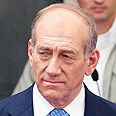
Olmert: Hostages' release before anything else
In meeting with UN representatives, Olmert makes Israel's stance clear. Military operation, he says, will not stop without releasing kidnapped soldiers, disarming Hizbullah, occupying border by Lebanon's army
The three UN representatives – Kofi Annan's special political advisor Vijay Nambiar, special envoy to Syria and Lebanon Terje Roed-Larsen, and UN Mideast envoy Alvaro de Soto – met Tuesday morning with Foreign Minister Tzipi Livni, and at the end of the meeting Roed-Larsen said they would also be meeting with the prime minister's representatives.
However, apparently by coincidence, the delegates unexpectedly met with Olmert himself, who made it clear that "Israel will continue fighting against Hizbullah until it returns the kidnapped soldiers and until the security of Israeli citizens is guaranteed."
Members of the delegation sent by Annan arrived at the Prime Minister's Offices and first met with the PMO head Yoram Turbovitch and diplomatic advisor Shalom Turjeman. During the meeting, diplomatic aides explained Israel's expectations from the international community to help solve the crisis. Olmert then entered the room and joined the meeting. His method of joining the meeting was similar to the way US President George Bush participates in discussions when he does not want to hold an official meeting – a "coincidental" entrance.
Hizbullah must be pushed back from border
Olmert told the UN delegation that Israel wanted to see the application of UN Resolution 1559, which calls for the Lebanese army to redploy on the Lebanon-Israel border and the disarmament of Hizbullah. The prime minister added that Israel demanded an immediate distancing of Hizbullah from the border with Israel. He emphasized these principles were already agreed upon by the leaders of the G8 nations when they voted on the resolution.
The Prime Minister's Office said: "The meeting dealt with ideas regarding the crisis on the northern border. Prime Minister Ehud Olmert joined at the end of the meeting and emphasized that Israel would continue the fighting against Hizbullah and would continue to hit the organization's targets until the kidnapped soldiers were returned and until security was ensured for the citizens of Israel. The prime minister thanked the UN secretary-general for his attempts to reach an agreement and thanked the delegation for trying to reach an arrangement in accordance with the principles detailed in the agreement."
Deputy Prime Minister Shimon Peres meanwhile addressed the possibility of a multi-national force in Lebanon – one of the temporary solutions proposed by the international community. "The Lebanese army has around 70,000 soldiers. They do not need an international force in order to take up border positions. They don't have the will to fight," Peres said.
He added: "Hizbullah is mocking the Lebanese government and the United Nations. Our experience with UNIFIL teaches that they cannot stop Hizbullah. And we must ask whether there is really an international force that is willing to use arms to stop the firing of 1,500 missiles over five days."










